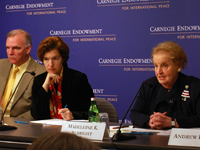Registration
You will receive an email confirming your registration.
Two decades after the fall of the Soviet Union, what do Russians, Ukrainians, and Lithuanians think about the direction of their countries and the state of their politics? A panel of experts led by former secretary of state Madeleine Albright discussed a new Pew Research Center report on public opinion in the three former Soviet republics. The new report, based on a 2011 survey and earlier surveys dating back to 1991, examines shifting views of democracy, free markets, political leadership, and how societies have been affected by the changes that have taken place since the end of the Soviet era. The panel also explored what lessons can be applied to the Arab Spring and reflected on recent popular discontent in Russia after the parliamentary elections.
Pew Research Center’s Andrew Kohut discussed the new findings with former Secretary of State Madeleine Albright, the International Republican Institute’s Stephen Nix, Carnegie Moscow’s Maria Lipman, and the National Democratic Institute’s Les Campbell. Susan Glasser, editor in chief of Foreign Policy, moderated.
What the New Data Reveals
- Popular Discontent: “People in the former communist world are looking back at the changes that they’ve endured over the past two decades with more reservations,” stated Kohut. Many Russians, Ukrainians, and Lithuanians are “profoundly unhappy” with their current political systems. These citizens are not opposed to the idea of democracy per se, he argued, but they oppose the difficult changes democracy has brought. In all three countries, there is growing disillusionment rather than a rejection of democratic values, he concluded.
- Public Attitudes: Only 35 percent of Ukrainians and 50 percent of Russians and Lithuanians support multi-party democracy, noted Kohut. Similarly, only 42 percent of Russians and 45 percent of Ukrainians and Lithuanians support the creation of a free market economy. He added that Ukrainians and Russians tend to favor strong-handed leaders while Lithuanians prefer democracy. Russian views of democracy differ from those in other parts of the world, Nix added, as they favor a “social democracy” in which the government provides social protection for all citizens and cares for the poor.
- Inequality: A large number of Russians, Ukrainians, and Lithuanians believe that ordinary people have suffered over the past two decades while business and political elites have benefitted, said Kohut. The idea that attaining success must come at another person’s expense is still common, but Lithuanians and young Russians tend to view success as the result of personal achievement.
The Twilight of Putin’s Russia
- Duma Elections: Government officials did not even to attempt to conceal the “shameless falsifications” in the recent parliamentary elections, said Lipman. Despite widespread reports of electoral fraud, however, few expected Russians to mobilize and protest in the streets. Russian voters dissatisfied with the ruling government recorded violations at polling stations and engaged in protest voting in order “to defy United Russia,” she added.
- A Disunited Opposition: Unlike the 2004 Orange Revolution in Ukraine, Russians do not have a central political figure or party around which to unite, noted Lipman. Many Russian citizens who identify with the opposition are outraged at the government’s misconduct, but “the cause of this movement is very vague.” The lack of a viable alternative to United Russia, Lipman added, is “a product of ‘managed democracy’ – of Putin’s rule."
- Putin’s Reaction: Lipman described Putin’s hostile response to U.S. Secretary of State Hillary Clinton’s criticism of the elections as a “knee-jerk reaction” and a sign of weakness. Albright agreed, adding that Putin lashes out at the West in order to avoid taking responsibility for fraudulent elections and other internal issues. “The problems are domestic; he is going to make a big point of trying to make them seem foreign,” Albright concluded.
- Implications for Putin’s Russia: The post-election protests are not an “overnight event,” but the beginning of a story that has yet to fully unfold, said Albright. She argued that “Putin is not immune to the crisis of confidence that is going on in a number of countries.” His decision to run for president in 2012 removed “even the veneer of choice” for Russian voters, and he will have to contain popular discontent to hold onto power, she added.
Russian Protests and the Arab Spring
Protestors in both Cairo and Moscow have expressed outrage at their political systems but have also shown enthusiastic support for elections, noted Campbell. He suggested that these “seemingly contradictory impulses” illustrate that middle class Egyptian protestors, like their Russian counterparts, are demanding greater dignity, government accountability, and an end to state oppression. In the case of Russia, he concluded that “the stolen elections are emblematic of the arrogance, graft, corruption that they [middle class Russians] hate.”
